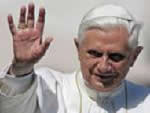|
Pope Benedict XVI- Angelus |

Angelus Message
On the Meaning of Death
With Christ, "It Has Been Deprived of Its 'Venom'"
H.H. Benedict XVI
November 5, 2006
www.zenit.org
Dear Brothers and Sisters:
During these days that follow the liturgical commemoration of the
dead, many parishes celebrate the octave of the dead, an appropriate
occasion to remember our loved ones in prayer and to meditate on the
reality of death, which the "civilization of comfort" often tries to
remove from people's conscientiousness, immersed in the concerns of
daily life.
To die, in fact, is part of life and not only of its end, but, if we
pay attention, of every instant. Despite all the distractions, the
loss of a loved one makes us discover the "problem," making us feel
death as a radically hostile presence contrary to our natural
vocation to life and happiness.
Jesus revolutionized the meaning of death. He did so with his
teaching, above all by facing death himself. "Dying he destroyed
death," says the liturgy of the Easter season. "With the Spirit that
could not die, Christ defeated death that was killing man," wrote a
Father of the Church (Melito of Sardis, "On Easter," 66). In this
way, the Son of God wished to share our human condition to the end,
to open it to hope. Ultimately, he was born to be able to die and in
this way to free us from the slavery of death. The Letter to the
Hebrews says: "that by the grace of God he might taste death for
everyone" (2:9).
Since then, death is no longer the same: It has been deprived, so to
speak, of its "venom." The love of God, acting in Jesus, has given
new meaning to the whole of man's existence and in this way, has
also transformed death. If in Christ human life is a departure "from
this world to the Father" (John 13:1), the hour of death is the
moment in which this departure takes places in a concrete and
definite way.
Those who commit themselves to live like him are freed from the fear
of death, no longer showing the sarcastic smile of an enemy but
offering the friendly face of a "sister," as St. Francis wrote in
the "Canticle of Creatures." In this way, God can also be blessed
for it: "Praise be to you, my Lord, for our Sister Bodily Death." We
must not fear the death of the body, faith reminds us, as it is a
dream from which we will awake one day.
The authentic death, which one must fear, is that of the soul,
called by the Book of Revelation "second death" (cf. 20:14-15;
21:8). In fact, he who dies in mortal sin, without repentance,
locked in prideful rejection of God's love, excludes himself from
the Kingdom of life.
Through the intercession of Mary Most Holy and of St. Joseph, let us
pray to the Lord for the grace to prepare serenely to depart from
this world, when he wills to call us, with the hope of being able to
be with him eternally, in the company of the saints and of our
deceased loved ones.
[At the end of the Angelus, the Pope greeted pilgrims in several
languages. In Italian, he said:]
I follow with profound concern the news on the serious deterioration
of the situation in the Gaza Strip and I wish to express my
closeness to the civilian populations suffering the consequences of
the violence.
I ask you to join me in my prayer so that Almighty and Merciful God
will illuminate the Israeli and Palestinian authorities, as well as
those nations that have a particular responsibility in the region,
so that they will commit themselves to halt the bloodshed, to
multiply the initiatives of humanitarian help, and favor the
immediate resumption of a direct, serious and concrete negotiation.
[Translation by ZENIT]
[In English, he said:]
I am happy to greet all the English-speaking pilgrims and visitors
present for today's Angelus, especially the students and teachers
from the Arcus College of Heerlen, Holland. During this week
following All Souls Day, we remember in a special way our deceased
brothers and sisters. With firm confidence we pray that all who have
gone before us in faith may share fully in the victory of Christ
over death. I wish you all a pleasant stay in Rome and a blessed
Sunday!
Look at the One they
Pierced!
This page is the work of the Servants of the Pierced Hearts of Jesus and
Mary